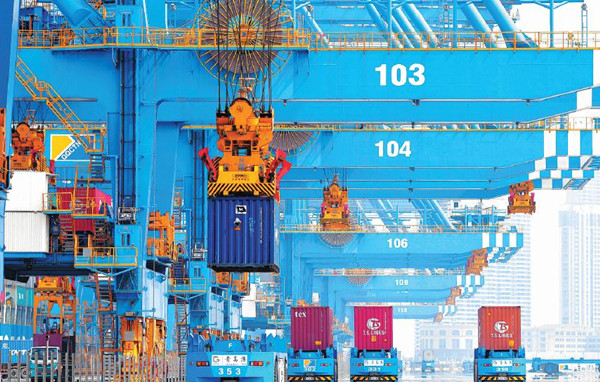Spotlight Focuses on Road to Future

Containers are unloaded at Qingdao Port in Shandong province in March. [Photo by Yu Fangping/For China Daily]
Major choice
During the 14th Five-Year Plan period, the country will accelerate fostering the new development paradigm of "dual circulation", where domestic and foreign markets boost each other, with the domestic market as the mainstay.
Xu described building a new development paradigm as "a major strategic choice" for China's overall, systematic and deep-rooted transformation. She said it will help reshape the country's competitive edge in international cooperation and competition, and contribute to its development in a more robust and sustainable manner.
The new development paradigm does not mean China will develop behind closed doors, Xu said, but it will push the country's opening-up to a higher level and allow it to build even closer economic connections with the rest of the world and create broader market opportunities for other countries.
Profound changes in the domestic and international situations meant China had to readjust its development strategy when drawing up its economic and social development plan for the next five years. The nation aims to achieve sustained and healthy economic development with a focus on innovation-driven and high-quality growth.
As China shifts to the new development paradigm of "dual circulation", it has made clear that there will be no change in its orientation toward the global economy. While tapping the potential of the domestic market, it will strive to build a higher-standard open economy.
Shan Hui, chief China economist for Goldman Sachs Research, said the key thinking behind the 14th Five-Year Plan is that China wants to focus on ways to make its economy more balanced and more resilient.
"We will be looking at how exactly the government spells out specific parameters to achieve those goals," Shan said.
"For example, we might be watching urbanization. What's the target for that? Given the importance of technology and innovation for China's future growth, how much will be invested in research and development? Are there any specifics to encourage and promote consumption?"
Shan said technology, consumption and environmental protection are three important fields in which China will place greater emphasis in the 14th Five-Year Plan, adding, "If you think about the guiding principles, there's the element of resilience, there's an element of sustainability."
Readjustment of the country's development strategy is the result of significant changes in the international situation, particularly rising unilateralism and protectionism, and the backlash against economic globalization. The coronavirus pandemic has impacted the global economy and posed severe challenges to the country's socioeconomic growth.
Huang Ping, a CPPCC member and former director of the Institute of European Studies at the Chinese Academy of Social Sciences, said that under such circumstances, China's decision to pursue high-quality, innovation-driven growth and the new development paradigm of "dual circulation" will contribute greater certainty to a volatile world.
The nation's strategic achievements in controlling the pandemic had boosted the confidence of other countries fighting the virus, Huang said.
He added that the 14th Five-Year Plan to be approved by lawmakers at the two sessions, as well as the new development paradigm, would inject confidence and stability into the faltering global economy and changing international situation.
Analysts said it is hoped that specific plans will be announced at the two sessions for strengthening national strategic technologies to resolve major difficulties constraining development and security, as well as measures to promote reforms and opening-up in an all-around way.
Policy actions will also include a road map for carbon dioxide emissions to peak by 2030 and to achieve carbon neutrality by 2060, they said.



